Are you finding yourself outdoors more these days, seeking the open road in an RV? Or maybe you’re a full-time RVer and looking to explore new places while saving some extra money.
Either way, there are plenty of options for free camping across the country that can provide unique experiences while helping keep costs down.
In this blog post, we’ll go over exactly where to park your RV and how to find the perfect spot for free.
We’ll also go over best practices when it comes to free camping, so that you can take advantage of all the benefits without compromising safety or comfort levels!
Table of Contents
Basics of Free RV Camping
Before looking for a place to park your RV, you need to know the difference between primitive and dispersed camping.
- Primitive camping is when you’re parking in an area specifically designated by the government as a campsite, usually with access to amenities such as restrooms or drinking water.
- Dispersed camping, on the other hand, is when you’re parking on public land that isn’t necessarily designated as a campsite. This often involves parking on the side of a road or in an open field with no amenities.
Dispersed camping means that you can camp for free in many places. But there are a few things to remember:
- Make sure that you are not in a place where camping is not allowed. You can check this by looking for signs that say you cannot camp there.
- Be aware of any local rules about noise and fires before you start camping. [1]
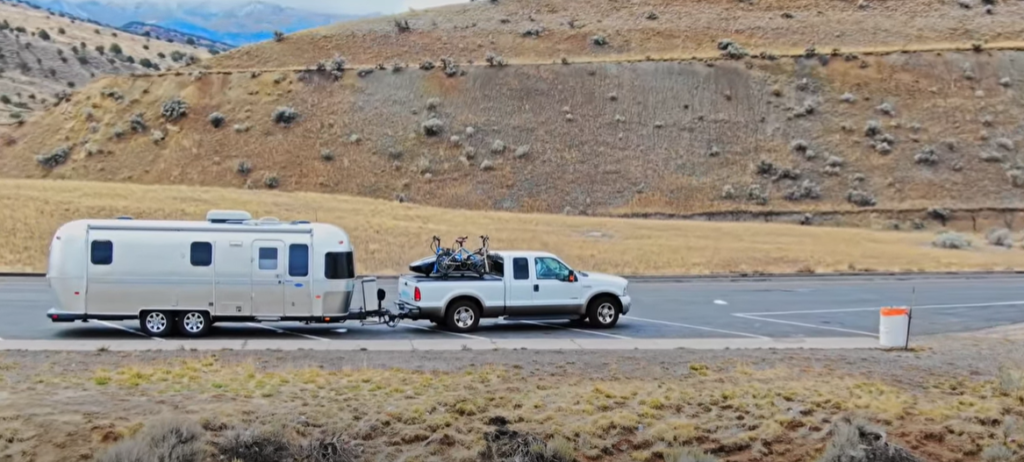
Can You Park Your Camper for Free?
The answer is: yes, you can park your camper for free in many places! Dispersed camping on public land is a great way to save money and still have an enjoyable camping experience.
When looking for a place to park for free, there are three main categories to keep in mind: national forests, Bureau of Land Management land, and state parks. All three of these can offer free camping opportunities for RVers.
Why Camp for Free?
Camping for free is a great way to save money and still have an enjoyable experience. Whether you’re taking a short weekend trip or planning an extended journey, knowing where to find free camping spots can make the difference when it comes to budgeting for your travels.
Plus, camping for free is an excellent way to reduce your environmental impact when you’re out on the road.
Many traditional campgrounds require electricity and water hookups which increases your carbon footprint, so going off-grid for some of your camping trips can help reduce your overall environmental impact.
What Do You Need to Camp for Free?
There are a few things you should always bring when you go camping for free.
- Bring plenty of water and food – even if there aren’t any places to buy these things nearby.
- You’ll also need a strong tent, sleeping bags, and warm clothes for cold nights.
- Bring a flashlight and first aid kit in case something bad happens.
It’s also important to remember that the basics of safety still apply when camping for free. Don’t camp alone, let someone know where you are going and when you plan to return, and pay attention to your surroundings at all times. [1]
What About Water And Sewer When Camping For Free?
When camping for free, you won’t have access to water and sewer hookups like you would in traditional campgrounds. The good news is that there are several options for collecting water and disposing of waste.
One way to get water is to collect rainwater in big containers. You can use it for drinking or cleaning up after meals. You can also have a portable tank for getting rid of sewage. You can empty it at special places where people are allowed to do that.
Finally, many free camping spots have access to potable water and dump stations nearby, so it’s always good to check with the local ranger station or visitor center before setting up camp.
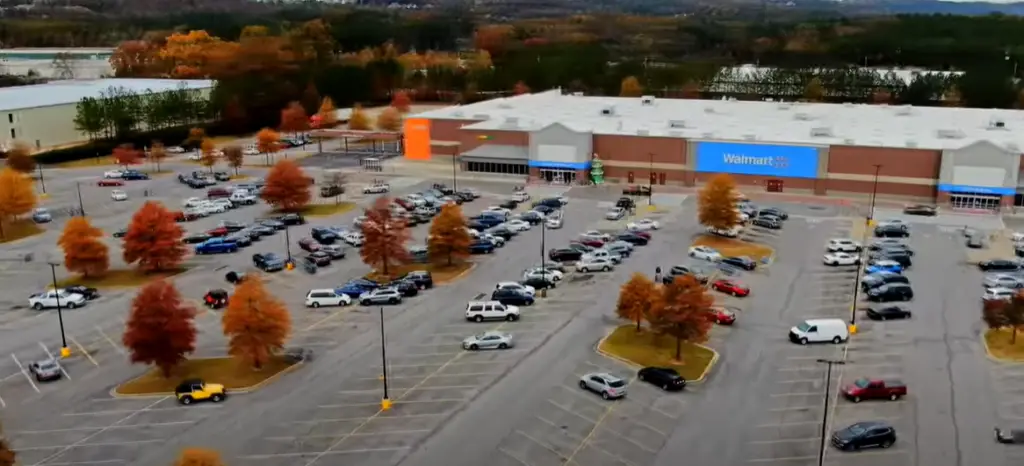
How to Find Places to Camp for Free?
Finding places to camp for free is as easy as looking online. There are several websites that list potential campsites, including their location and amenities.
You can also check out forums or social media groups dedicated to RV camping, which often include information on where to find free campsites.
When you’re ready to hit the road, it’s a good idea to bring a map so you can easily locate the campsites that interest you.
And don’t forget to check with local ranger stations and visitor centres for up-to-date information on free camping opportunities in the area.
Where to Park an RV for Free?
Walmart Free RV Parking
One of the most popular ways to park an RV for free is at Walmart. Walmarts across the country allow travellers to stay in their parking lots overnight, making them great places for budget-minded campers.
Before setting up camp at a Walmart location, it’s important to check with the store first and make sure that they are allowing RV parking.
Another important thing to keep in mind with Walmart free camping is that it’s only allowed for one night at a time, so you won’t be able to stay there indefinitely.
But it can be a great way to save money if you’re just looking for a quick rest stop on your journey.
Free Overnight Parking At Rest Stops
If you are allowed, camping for free at a rest stop can be a great way to save money while travelling. However, make sure to check the local laws and regulations before stopping at a rest stop – some places do not allow overnight parking.
When you’re staying at a rest stop, it’s important to be courteous and respect the space. Don’t leave any trash behind, don’t block other vehicles from entering or exiting, and try to keep noise levels to a minimum.
Truck Stop Camper Parking
Truck stops are another good place for free camping. Some have special areas for campers while others let you park your camper in the regular parking lot overnight. Be aware that some truck stops only let you stay for a short time, so always check with the staff first before setting up camp.
Like rest stops, it’s important to be respectful and follow the rules when camping at a truck stop. Be sure to keep your spot clean, pick up after yourself, and leave no trace of your stay behind.
Gas Stations
Many of these places are happy to let you park in their lot overnight, as long as you’re respectful and follow the rules. Before setting up camp, it’s always a good idea to check with the store manager or owner to make sure that it’s okay.
When camping at a gas station, be sure to keep the noise level down and don’t stay longer than necessary. You should also leave your spot as clean or cleaner than you found it so that other campers can enjoy their stay as well. [2]
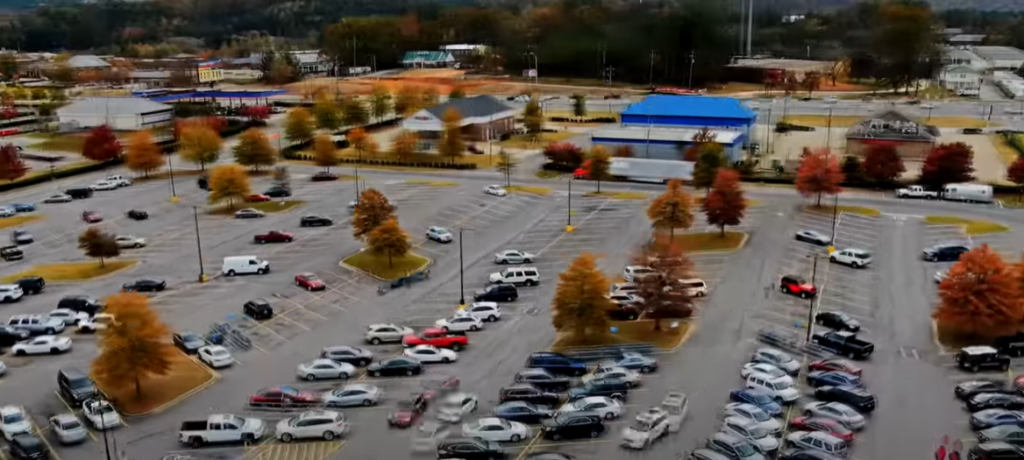
Free RV Parking at Hotels/Motels
If you need a place to stay, and don’t mind paying, many hotels and motels offer free RV parking. This is usually a great option if you need access to electricity or other amenities that free spots often lack.
Before parking your RV at a hotel or motel, make sure to call ahead and check if they offer free parking. Some places may also ask for a valid ID or credit card, so make sure to double-check the rules before you arrive.
City Park Overnight RV Camping
Many of them offer free or low-cost camping spots, and they also tend to have plenty of amenities such as toilet facilities and showers.
Before setting up camp at a city park, be sure to check with the local ranger station or visitor center for up-to-date information on free camping opportunities.
You should also check the park’s website and/or call ahead so that you know what to expect when you arrive.
Other Free and Cheap RV Camping Options
There are many other options for free or low-cost camping with your RV. Look into state parks, military campgrounds, national forests, and BLM land. These are all great options if you’re looking for a more rustic experience.
It’s always a good idea to call or check the website ahead of time to make sure that the campground is open and to get a better idea of what amenities are available.
Tips for Finding Free RV Campsites
When looking for a place to park your RV, there are several tips and tricks that can make the process easier. Here are some of the best tips for finding free campsites:
- Look into national forests and Bureau of Land Management land. The U.S. Forest Service and the Bureau of Land Management both manage public lands that you can camp on for free. Look at their websites or call the local office to get more information about campsites in your area.
- Search online for free camping resources. There are a lot of websites and forums devoted to helping people find free campsites. Look for websites that focus on your particular area and read the reviews to get an idea of what camping is like in each spot.
- Talk to locals and other RVers. The best way to find out about great places to camp is by talking to people who know the area well. Chat with locals at gas stations or convenience stores, or ask other RVers you meet on the road for advice.
- Use a GPS device to help find spots. A GPS unit can be a great tool when looking for free campsites. Look for points of interest and “waypoints” that indicate areas where camping is allowed. Some apps also allow you to find nearby campsites.
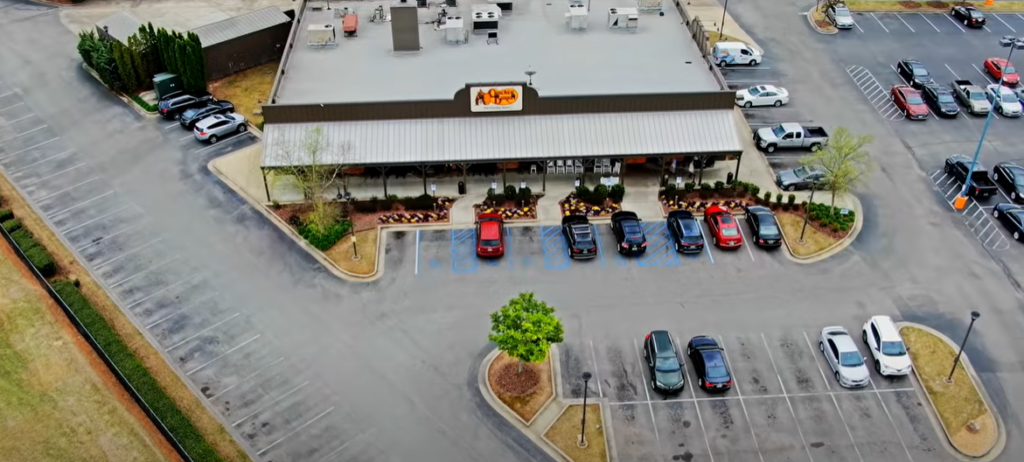
FAQ
Where is the best place to park your RV?
The best place to park your RV will depend on what you are looking for. If you’re looking for free camping, consider national forests and Bureau of Land Management land, or look into gas stations and city parks. Hotels and motels may also offer free parking for RVs.
Are there any apps that can help me find free RV camping spots?
Yes, there are several apps that can help you find free campsites. Apps like Campendium, FreeCampsites.net, and RV Parky all have great reviews and offer a wealth of information about free or low-cost campsites in the U.S.
What should I do if I’m looking for a place to stay overnight?
If you’re looking for a place to stay overnight, consider staying at hotels or motels that offer free RV parking. This is usually a great option if you need access to electricity or other amenities that free spots often lack. Or, look into state parks, military campgrounds, national forests, and BLM land.
Are there any restrictions on free RV camping?
Yes, there may be restrictions on free RV camping depending on where you are staying. Be sure to check with the local ranger station or visitor center for up-to-date information and rules before setting up camp.
It’s also a good idea to call ahead or check the park’s website so that you know what to expect when you arrive.
What is the most reliable RV to buy?
The most reliable RV to buy will depend on your individual needs. Research different makes and models and read reviews from other RVers to find out which RV is best for you.
Consider factors like size, fuel efficiency, storage space, comfort level, and cost. Ultimately, the best RV for you is the one that meets your needs and fits within your budget.
Overall, there are plenty of options for finding spots to park your RV for free. With a little research and preparation, you can find the perfect spot that fits both your needs and your budget.
Remember to be respectful of the land and follow all local laws and regulations when camping.
What is considered high mileage for an RV?
High mileage for an RV will depend on the age and condition of the vehicle. Generally speaking, a newer RV that has been well maintained can have up to 100,000 miles without needing significant repairs.
An older RV with higher mileage may need more frequent maintenance or repair work. It is important to inspect any used RVs thoroughly before making a purchase to make sure it is safe and reliable.
What is the lifespan of an RV?
The lifespan of an RV will depend on a variety of factors, including the type and quality of materials used to build it, how well it is maintained and stored, and the amount of use it gets.
Generally speaking, well-maintained RVs can last for decades if properly cared for. However, the average life expectancy of an RV is around 10 to 15 years.
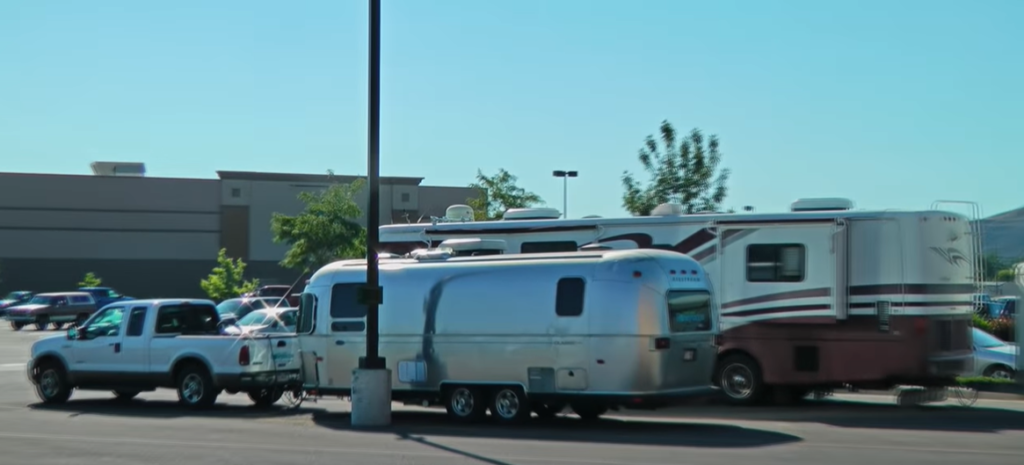
What is the best way to store an RV?
The best way to store an RV is in a covered or enclosed space, such as a garage or storage unit. If this is not possible, make sure to cover your RV with a tarp or other protective material and use tire covers to keep the tires from drying out.
It is also important to winterize your RV before storing it to prevent damage from freezing temperatures. Additionally, you should have the brakes and suspension system checked regularly for any signs of wear or tear.
Is it worth buying an old RV?
Buying an old RV can be a great way to save money while still getting the features you want. However, it is important to inspect any used RVs thoroughly before making a purchase to make sure it is safe and reliable.
Be sure to check for common wear and tear, such as cracks in the roof or walls, water damage, and rust. Have a qualified mechanic inspect the engine and other mechanical parts.
You should also look up if there have been any recalls or service bulletins for the model of RV you are thinking of buying. With a little extra work, an old RV can be a great investment.
How do I find free RV camping spots?
You can find free RV camping spots by doing a search online. You can also look for campgrounds and parking lots that offer free or discounted stays. Some services, such as Boondockers Welcome, allow you to connect with people who are willing to host RVers on their property.
Other sites such as Campendium and Freecampsites.net provide maps of free RV camping spots across the country.
How do I prepare for an RV trip?
Preparing for an RV trip is important to make sure you have a safe and enjoyable experience. Start by checking the condition of your RV, making any necessary repairs or upgrades.
Make sure all of your systems are operating properly, such as the brakes, electrical system, and water heater.
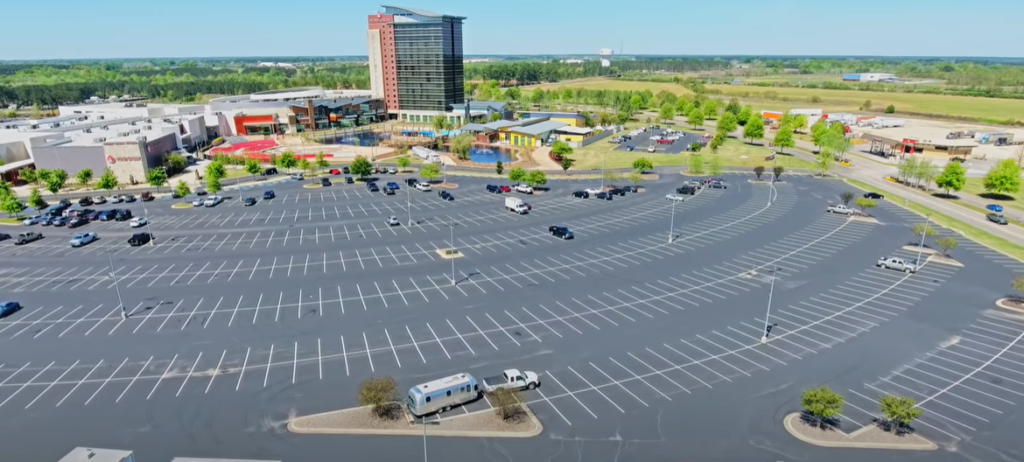
Why should I research local laws and regulations?
It is important to research local laws and regulations before your RV trip to be sure you are in compliance with all rules and requirements. Different areas may have restrictions on things like the length of stay, quiet hours, or what type of generators can be used.
Why is RV insurance important?
RV insurance is an important safety net that can help protect you from financial loss in the event of an accident or other unforeseen event.
Not all states require RV owners to have insurance, but it is a wise investment. Make sure to research different policies and companies to find the best coverage for your needs.
How can I save money on RV camping?
RV camping can be expensive, but there are ways to save money. Look for campgrounds and parking lots that offer discounts for staying longer or returning customers.
You can also look for deals through club memberships or special offers around the holidays. Additionally, it is always a good idea to compare rates between different campgrounds.
Does my RV need regular maintenance?
Yes, your RV needs regular maintenance to ensure that it is safe and reliable. Check the tires regularly for signs of wear or damage and make sure the brakes are working properly.
Make sure all electrical systems are in good condition, and inspect the roof, walls, and floors for any damage or water leaks. You should also change the oil, transmission fluid, and other fluids regularly to prevent any issues.
Do I need to register my RV?
In most states, you will need to register your RV with the local DMV before taking it out on the road. Be sure to check the laws in your area for specific requirements and fees.
Additionally, some states may require additional permits or inspections before registering an RV.
Does my RV need a license plate?
Yes, your RV needs to be registered with the DMV and will require a license plate in most states. The rules vary by state, so it is important to check the local laws before taking your RV on the road.
Do I need special insurance for my RV?
Yes, most states require RV owners to have adequate insurance coverage. Special policies are available that provide protection against losses due to theft, fire, and other events. Make sure to compare rates and policies between different companies before making a decision.
Can I park my RV anywhere?
No, you should not park your RV just anywhere. It is important to research sites ahead of time and make sure they are legal for overnight stays. Additionally, some areas may have restrictions on the size or type of vehicles allowed in certain areas.
Can I sleep in my RV while parked?
Yes, you can usually sleep in your RV while it is parked. However, some areas may have restrictions on the length of stay or overnight parking. Be sure to research local laws and regulations before setting up camp for the night.
Is there a way to park for free?
Yes, there are many options for free RV parking. Many businesses and organisations welcome travelers to stay in their parking lots overnight.
Additionally, some national parks may offer free camping opportunities for RVs. Be sure to research local laws and regulations before setting up camp for the night.
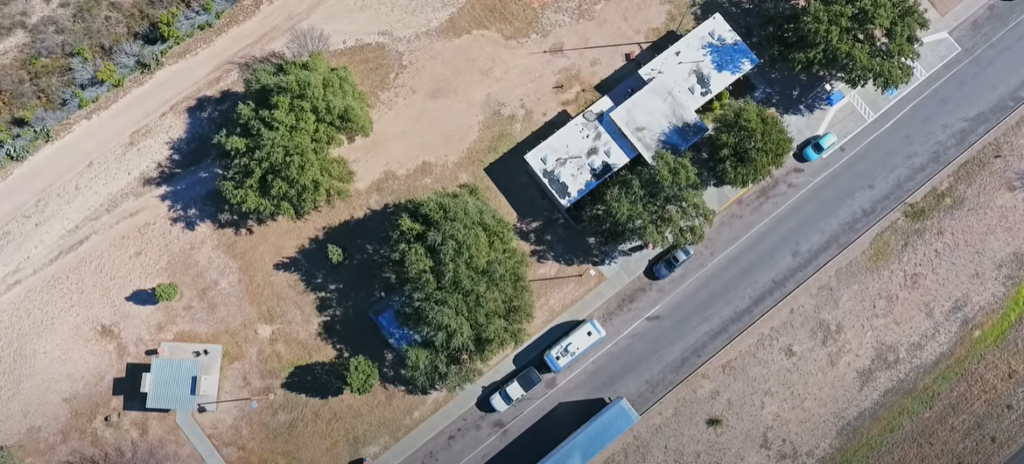
What is the best way to find RV parking?
The best way to find RV parking is to research ahead of time and make a plan. Look for campgrounds, businesses, or shopping malls that allow overnight stays.
Additionally, there are websites and apps available that can help you locate public land or free camping sites. It is always important to check local laws and regulations before camping in any area.
When is the best time to buy an RV?
The best time to buy an RV is different for everyone. It depends on your budget and what you need.
You can usually find better deals during the off-season or winter months. Look for sales around the holidays and special offers from dealerships or manufacturers. Additionally, compare rates between different models and brands before making a purchase to get the best deal possible.
What safety tips should I keep in mind while RVing?
RV safety is important for both you and your passengers. Be sure to keep the following tips in mind: wear seat belts at all times, never drive under the influence of drugs or alcohol, avoid driving during inclement weather, stay alert, and always obey speed limits.
Additionally, check the tires regularly for signs of wear or damage and make sure the brakes are working properly. Make sure all electrical systems are in good condition, and inspect the roof, walls, and floors for any damage or water leaks.
Finally, be aware of other vehicles on the road and take extra precautions when driving on winding roads or at night.
Useful Video: 10 FREE Places to RV Park Overnight
Conclusion
If you are looking for a place to park your RV for free, consider visiting one of the many state or national parks. Some of these parks offer overnight camping for RVs, and others may have specific areas set aside for RV parking.
You can also check with local businesses, such as Walmart or truck stops, to see if they allow overnight RV parking on their property. With a little bit of planning, you should be able to find a safe and convenient spot to park your RV for free.
References:
- https://rvlife.com/where-can-you-park-your-camper-for-free/
- https://campaddict.com/free-rv-parking/

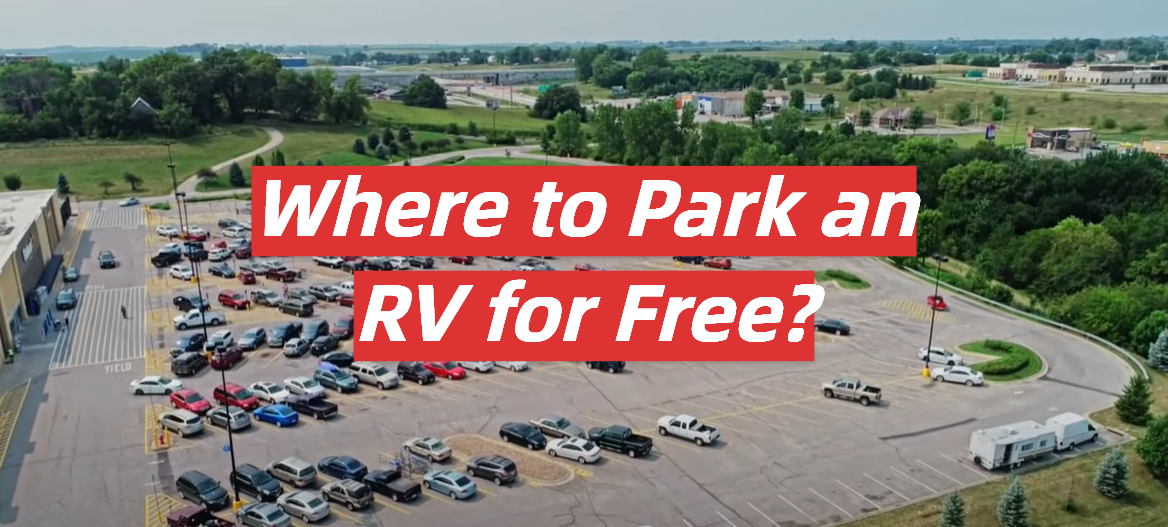

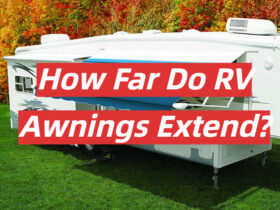
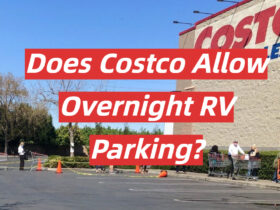
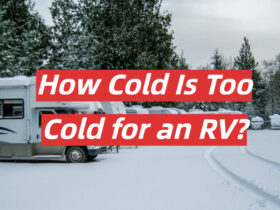
Leave a Reply